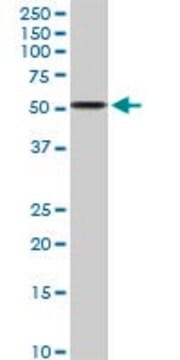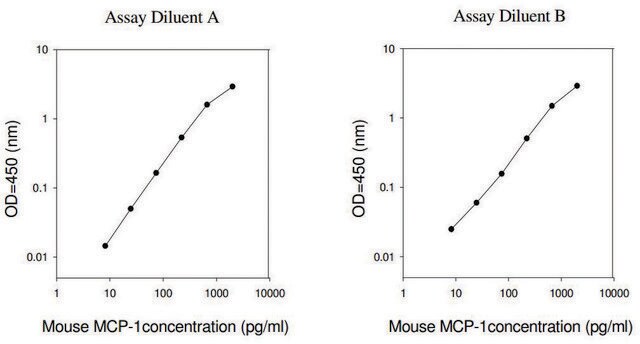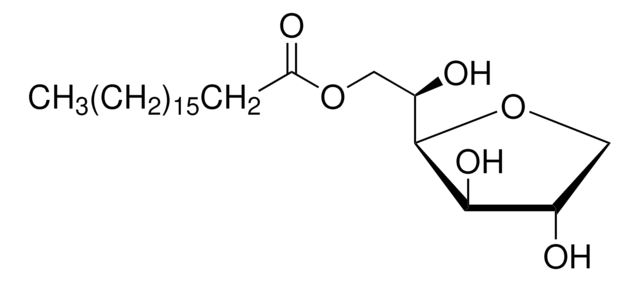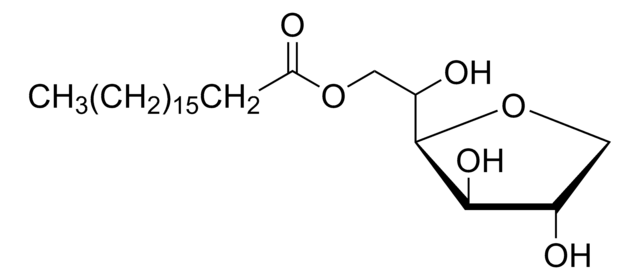HPA014769
Anti-ALDH3A2 antibody produced in rabbit
Prestige Antibodies® Powered by Atlas Antibodies, affinity isolated antibody, buffered aqueous glycerol solution
동의어(들):
Anti-ALDH10, Anti-FALDH, Anti-SLS, ALDH3A2 Antibody - Anti-ALDH3A2 antibody produced in rabbit, Aldh3A2 Antibody
로그인조직 및 계약 가격 보기
모든 사진(2)
About This Item
결합:
unconjugated
application:
IHC
클론:
polyclonal
종 반응성:
human
citations:
5
기술:
immunohistochemistry: 1:50- 1:200
추천 제품
생물학적 소스
rabbit
Quality Level
결합
unconjugated
항체 형태
affinity isolated antibody
항체 생산 유형
primary antibodies
클론
polyclonal
제품 라인
Prestige Antibodies® Powered by Atlas Antibodies
양식
buffered aqueous glycerol solution
종 반응성
human
기술
immunohistochemistry: 1:50- 1:200
면역원 서열
SHNHKLIKRMIDETSSGGVTGNDVIMHFTLNSFPFGGVGSSGMGAYHGKHSFDTFSHQRPCLLKSLKREGANKLRYPPNSQSKVDWGKFFLLKRFNKE
UniProt 수납 번호
배송 상태
wet ice
저장 온도
−20°C
타겟 번역 후 변형
unmodified
유전자 정보
human ... ALDH3A2(224)
일반 설명
ALDH3A2 (aldehyde dehydrogenase 3 family, member A2) is a fatty aldehyde dehydrogenase, which has two alternatively spliced isoforms, differing at their C-termini. This gene is localized to human chromosome 17p11.2, spans 31kb, and contains 11 exons. The predominant isoform has 485 amino acids, and the other isoform has 508 amino acids. It also has three isoforms differing in their sizes, and the two longer transcripts are predominant in brain, heart, pancreas, and skeletal muscle. The shorter isoform is abundant in liver.
면역원
Fatty aldehyde dehydrogenase recombinant protein epitope signature tag (PrEST)
애플리케이션
Anti-ALDH3A2 antibody produced in rabbit, a Prestige Antibody, is developed and validated by the Human Protein Atlas (HPA) project . Each antibody is tested by immunohistochemistry against hundreds of normal and disease tissues. These images can be viewed on the Human Protein Atlas (HPA) site by clicking on the Image Gallery link. The antibodies are also tested using immunofluorescence and western blotting. To view these protocols and other useful information about Prestige Antibodies and the HPA, visit sigma.com/prestige.
Applications in which this antibody has been used successfully, and the associated peer-reviewed papers, are given below.
Western Blotting (1 paper)
Western Blotting (1 paper)
생화학적/생리학적 작용
ALDH3A2 (aldehyde dehydrogenase 3 family, member A2) is responsible for the oxidation of medium and long-chain fatty aldehydes, giving rise to carboxylic acids. It is a microsomal enzyme, and catalyzes the above reaction in an NAD (nicotinamide-adenine-dinucleotide)-dependent manner. It is also responsible for catalyzing the oxidation of fatty alcohols, and is a part of the fatty alcohol:NAD+ oxidoreductase (FAO) complex. Inactivation of this gene might lead to the accumulation of highly active lipids and fatty alcohols, eventually affecting the integrity of plasma membrane. Mutations in this gene lead to the autosomal recessive disorder called Sjögren-Larsson syndrome (SLS), which is characterized by mental retardation, ichthyosis, and spastic diplegia or tetraplegia.
특징 및 장점
Prestige Antibodies® are highly characterized and extensively validated antibodies with the added benefit of all available characterization data for each target being accessible via the Human Protein Atlas portal linked just below the product name at the top of this page. The uniqueness and low cross-reactivity of the Prestige Antibodies® to other proteins are due to a thorough selection of antigen regions, affinity purification, and stringent selection. Prestige antigen controls are available for every corresponding Prestige Antibody and can be found in the linkage section.
Every Prestige Antibody is tested in the following ways:
Every Prestige Antibody is tested in the following ways:
- IHC tissue array of 44 normal human tissues and 20 of the most common cancer type tissues.
- Protein array of 364 human recombinant protein fragments.
결합
Corresponding Antigen APREST71639
물리적 형태
Solution in phosphate-buffered saline, pH 7.2, containing 40% glycerol and 0.02% sodium azide
법적 정보
Prestige Antibodies is a registered trademark of Merck KGaA, Darmstadt, Germany
면책조항
Unless otherwise stated in our catalog or other company documentation accompanying the product(s), our products are intended for research use only and are not to be used for any other purpose, which includes but is not limited to, unauthorized commercial uses, in vitro diagnostic uses, ex vivo or in vivo therapeutic uses or any type of consumption or application to humans or animals.
적합한 제품을 찾을 수 없으신가요?
당사의 제품 선택기 도구.을(를) 시도해 보세요.
Storage Class Code
10 - Combustible liquids
WGK
WGK 1
Flash Point (°F)
Not applicable
Flash Point (°C)
Not applicable
개인 보호 장비
Eyeshields, Gloves, multi-purpose combination respirator cartridge (US)
가장 최신 버전 중 하나를 선택하세요:
M A Willemsen et al.
Brain : a journal of neurology, 124(Pt 7), 1426-1437 (2001-06-16)
Sjögren-Larsson syndrome (SLS) is an autosomal recessively inherited neurocutaneous disorder caused by a deficiency of the microsomal enzyme fatty aldehyde dehydrogenase (FALDH). We report the clinical characteristics and the results of molecular studies in 19 SLS patients. Patients 1-17 show
W B Rizzo et al.
American journal of human genetics, 65(6), 1547-1560 (1999-12-01)
Sjögren-Larsson syndrome (SLS) is an autosomal recessive disorder characterized by ichthyosis, mental retardation, spasticity, and deficient activity of fatty aldehyde dehydrogenase (FALDH). To define the molecular defects causing SLS, we performed mutation analysis of the FALDH gene in probands from
William B Rizzo et al.
Human mutation, 26(1), 1-10 (2005-06-03)
Sjögren-Larsson syndrome (SLS) is an autosomal recessive disorder characterized by ichthyosis, mental retardation, and spastic diplegia or tetraplegia. The disease is caused by mutations in the ALDH3A2 gene (also known as FALDH and ALDH10) on chromosome 17p11.2 that encodes fatty
Anatole Ghazalpour et al.
PLoS genetics, 7(6), e1001393-e1001393 (2011-06-23)
The relationships between the levels of transcripts and the levels of the proteins they encode have not been examined comprehensively in mammals, although previous work in plants and yeast suggest a surprisingly modest correlation. We have examined this issue using
자사의 과학자팀은 생명 과학, 재료 과학, 화학 합성, 크로마토그래피, 분석 및 기타 많은 영역을 포함한 모든 과학 분야에 경험이 있습니다..
고객지원팀으로 연락바랍니다.








